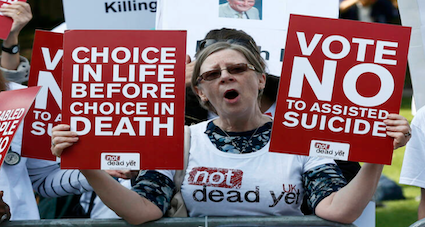There is explosive growth of “assisted suicide” in Canada.
Compassion and autonomous decision-making were how this new program was sold to Canadians, and it is being expanded.
The Canadian Government is killing its own people on purpose to “alleviate suffering”, while saving money on health care costs down the line.
In 2015, Canada’s Supreme Court ruled that assisted suicide was constitutional. In June 2016, Parliament passed Bill C-14, otherwise known as the Medical Assistance in Dying Act. MAiD was now the law of the land. Anyone who could show that their death was “reasonably foreseeable” was eligible. In this respect, Canada was hardly alone: The Netherlands, Switzerland, Belgium, Spain, Australia, and New Zealand, among others, allow assisted suicide. So do ten states in the U.S.
In 2017, the first full year in which MAiD, which is administered by provincial governments, was in operation, 2,838 people opted for assisted suicide, according to a government report. By 2021, that figure had jumped to 10,064—accounting for more than 3 percent of all deaths in Canada that year.
There have been a total of 31,664 MAiD deaths and the large majority of those people were 65 to 80 when they died. In 2017, only 34 MAiD deaths were in the 18- to 45-year-old category. In 2018, that figure rose to at least 49. In 2019, it was 103; in 2020,118; and in 2021, 139.
Today, thousands of people who could live for many years are applying—successfully—to kill themselves.
“Assisted suicide” is now closing in on 5% of all deaths annually in several Canadian provinces:
Indeed, in some Canadian provinces nearly 5 percent of deaths are MAiD deaths. In 2021, the province of Quebec reported that 4.7 percent of deaths in the province were due to MAiD; in British Columbia, the number was 4.8 percent. Progressive Vancouver Island is unofficially known as the “assisted-death capital of the world,” said doctors.
Expansion of the program:
Why the dramatic increase?
Over the past few years, doctors have taken an increasingly liberal view when it comes to defining “reasonably foreseeable” death. Then, last year, the government amended the original legislation, stating that one could apply for MAiD even if one’s death were not reasonably foreseeable. This second track of applicants simply had to show that they had a condition that was “intolerable to them” and could not “be relieved under conditions that they consider acceptable.” This included applicants like Margaret Marsilla’s son, Kiano.
In 2023, those numbers are almost certain to rise.
Next March, the government is scheduled to expand the pool of eligible suicide-seekers to include the mentally ill and “mature minors.” According to Canada’s Department of Justice, parents are generally “entitled to make treatment decisions on their children’s behalf. The mature minor doctrine, however, allows children deemed sufficiently mature to make their own treatment decisions.” (The federal government does not define “mature,” nor does it specify who determines whether one is mature. On top of that, the doctrine varies from one province to another.)
Concerns:
Dr. Dawn Davies, a palliative care physician who supported MAiD when it was first conceived, said she had “tons of worries” about where this might lead. She could imagine kids with personality disorders or other mental health issues saying they wanted to die. “Some of them will mean it, some of them won’t,” she said. “And we won’t necessarily be able to discern who is who.”
Hugh Scher, an attorney advising Margaret Marsilla, told me: “While other countries have explored extending assisted suicide to minors, those governments have insisted on substantial safeguards, including parental notification and consent. Canada is poised to become the most permissive euthanasia regime in the world, including for minors and people with only psychiatric illness, having already removed the foreseeability of death or terminal illness as an essential condition to access euthanasia or assisted suicide.”
Dr. Ellen Warner is an oncologist at the prominent Sunnybrook Research Institute, in Toronto, and a professor at the University of Toronto’s medical school. “My objection to MAiD, from day one, was that there was no way we would be able to avoid this slippery slope, because these aren’t black and white cases,” she said. “I’m 100 percent against MAiD. I’m an old-fashioned Hippocratic Oath kind of doctor.”
The not-real slippery slope is always real.
The argument in favour:
But Dr. Derryck Smith, a psychiatrist at the University of British Columbia, views the rise in MAiD deaths as progress. (Smith never took the Hippocratic Oath, he said, because he thought it was “archaic.”) “MAiD is about relieving suffering, respecting human dignity, and recognizing the inherent right for individuals to make decisions affecting their health and even their death,” Smith told me. Assisted suicide, he pointed out, had been happening for ages. “Before MAiD, patients who were going to die were assisted along the way with high doses of narcotics,” he said. “The rationale was to ‘make people comfortable.’”
This entire issue screams out for ethicists, and I am not one. My question is: what does this say for the societies that have been built in the West? And the follow-up question: Does it indicate a lack of meaning for its citizens?
(This piece is taken with gratitude from CommonSense)


